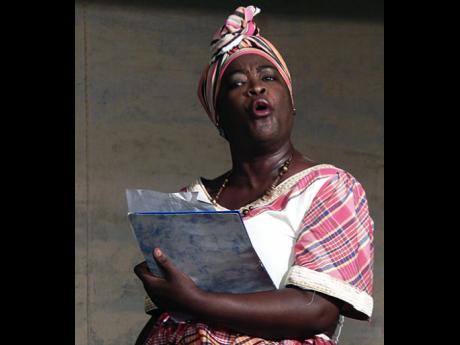Women Who Roar entertaining, informative
Women Who Roar is the latest in the Little Theatre Movement's (LTM) heritage series of productions. An entertaining and informative mix of poetry, skits, movement and music, it follows the general format of previous shows. Those began with the popular Augus Mawnin, first staged in 1997 and remounted several times after.
Producer/coordinator Barbara Gloudon notes in the printed programme that Women Who Roar gives snapshots of famous Jamaican women, retrieved from assorted published material (books, newspaper, poems and songs) as well as Gloudon's own family memories.
On Sunday, fine dancing, acting and singing from members of the pantomime company had many persons in the audience laughing, dancing while seated and occasionally talking back to the actors. The mainly adult audience included a dozen or so persons from a Golden Age home.
Their responses indicated they were familiar with the information presented about National Hero Nanny of the Maroons, internationally known Jamaican nurse Mary Seacole, politician and beautician Madam Rose Leon, Mrs Edna Manley and Lady Bustamante, among others. Sunday's show was supposed to be the final one, but precisely because a young audience might not know the importance of the women featured as well as the older folk did, the producers should consider taking the show to schools around the island.
The Little Little Theatre, Tom Redcam Avenue, St Andrew, where the production was mounted twice (a third show was cancelled because of the threat of Tropical Storm Earl) is much smaller than most school auditoriums, and schools have the potential to offer larger audiences. The theatre was only half-full on Sunday.
Music from an off-stage band comprising guitar, keyboard and drums starts the revue on an upbeat note, one that is generally maintained throughout the show. Naturally, there are some 'downs', but even the incidents that could be distressing are treated in a comical fashion.
MELODRAMATIC DEATH
For example, when, in a skit about the legendary White Witch of Rose Hall, Annie (played by Jacqueline Higgins) poisons her husband, Albert (Derrick Clarke), before our eyes, the death is played melodramatically. Even after he is supposed to be dead, Albert continues to clown around.
Obeying the instructions of an early song, Pop 'tory Gimme, the performers often begin skits with narrative. The storytelling frame helps to create an intimate atmosphere between performers and audience.
Thus, a scene showing women working and talking in a field is the prelude to a dramatisation of an incident involving Nanny and her female warriors preparing for battle in the mountains with British army soldiers. When the redcoats once fired on her, Nanny tells her followers, she lifted her skirt over her head and presented her bottom to them. The action was to show them that she had no respect for them, she explained. (Gloudon's version of the tale makes no mention of the popular story of Nanny actually catching the bullets.)
From a group of men in a restaurant, we hear about the erection of a statue in England to honour famed Jamaican nurse Mary Seacole. Later, women enter and everyone sings Mary Seacole was a Lioness.
The story of Norman Manley trying to get Alexander Bustamante and St William Grant released from jail is also started by men in a restaurant. An actress playing Edna Manley talks directly to the audience about the conception of her famous sculpture, Negro Aroused, before Clarke enters to recite a poem of the same name by George Campbell.
Not all of the women who roar are famous. The Louise Bennett poem Jamaican Woman about the strength and cunning of our women refers to them generally. It is recited by Barbara Johnson, the actress who later, in the skit Hot Dog on a Cold Night, tells the story of another nameless woman. By snarling like a savage, she scares another woman with a smelly dog from a bus shelter.
Dressed as a nurse, Kimberly McLaughlin first starts telling, then goes on to dramatise, the skit The Black Has Got the Keys about a Jamaican nurse working in an asylum in England, who gets the better of disrespectful inmates. Roaring like a lion, she chases them back to their beds and stops them, chanting "What has England come to? The black has got the keys."
Women Who Roar could persuade students who don't like civics or history to actually love those subjects.








